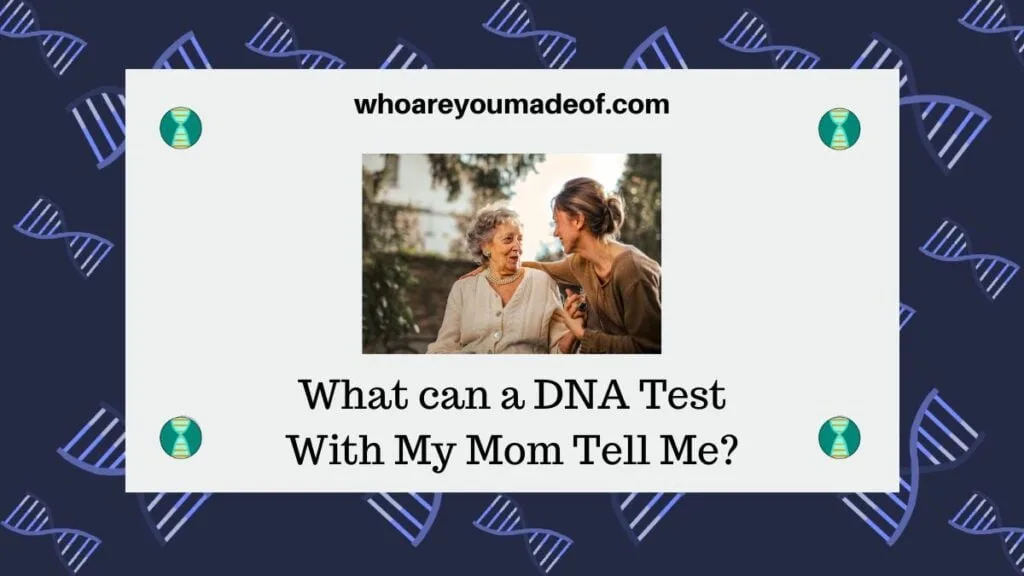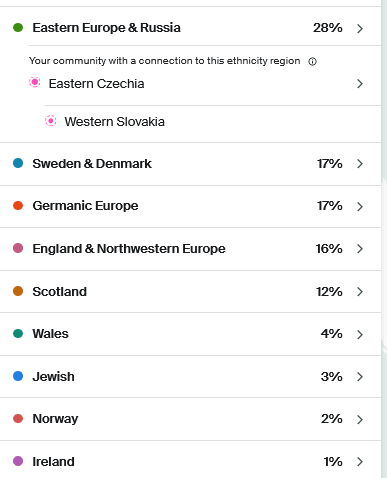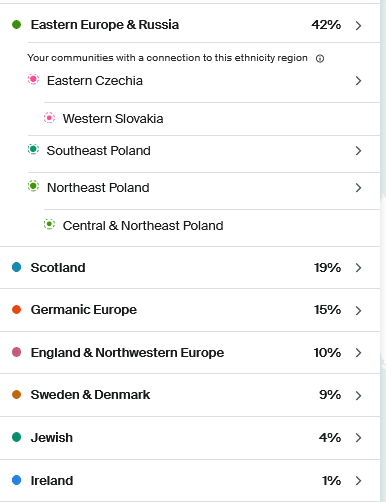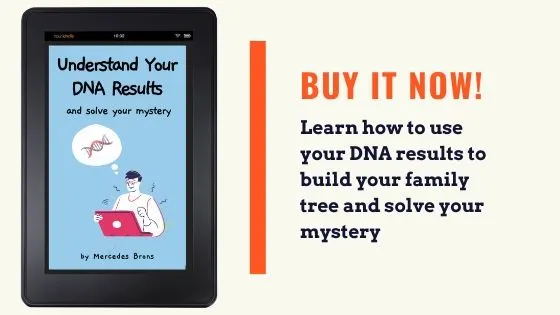If you have already done a genealogical DNA test, you might be wondering if there is any point in having your mom take one, too. If you want to know what you can learn from testing your mother, you have come to the right place.
It turns out, you can unlock a wealth of information about your family's history by having your mother do a DNA test!

You inherited 50% of your DNA from your mom, and the rest from your dad. This means that your mother has a huge portion of her DNA that she didn't pass down to you.
Why didn't you inherit all of your mother's DNA? There isn't enough room in your genome to hold all of your parents' DNA, which is why only half of each of their DNA was passed down to you.
Since you now understand that your mother has DNA that you don't have, you might see how a DNA test could help you learn even more about your ancestry, even if you already took a DNA test.
Below you will learn:
- The benefits of testing your mother - even if one or more of your siblings has tested
- Why your mom could show an ethnicity that you don't have
- How your mother will have different DNA matches than you
I was the first person in my immediate family to test my DNA. My mother tested hers about one year later after I explained to her how her DNA results could help me explore our family tree even further.
Benefits of having your mother do a DNA test
There are several benefits to have your mother take a genetic DNA test, like the one offered from Ancestry DNA, Family Tree DNA, MyHeritage, or 23andMe:
- You can discover new ethnicity that was not inherited by you or any siblings
- You will find additional living relatives
- You can learn how your DNA matches are related to you
- Acquire valuable information that can help trace your family tree
- You can estimate the ancestral origins of your maternal grandparents using your mother's results
Many people also wonder if there is still a benefit to testing their mother's DNA when one or more of their siblings have already take a DNA test. While it is true that it is also beneficial for your siblings to test their DNA, it's even better for your mother to take the test.
Each child inherits 50% of their DNA from their mom, but it will never be the exact same 50% that your sibling inherited. Even if a couple has many children, there will always be a certain amount of DNA from each parent that did not get passed down.
This means that if you and your siblings have all take a DNA test, your mother likely still has DNA that was not passed down to any of you. The DNA that you did not inherit from your mother contains important information that can be tested to learn about your ancestors.
Find new ethnicity by having your mother do a DNA test
Your personal ethnicity estimate is only a snapshot of a portion of your family's true ethnic background. You have inherited DNA from only a select portion of your more distant ancestors.
As you already know, you did not inherit 50% of each of your mom's DNA. The same is true for each generation, meaning that over the course of a few generations, some DNA is completely lost.
The images below are the most recent (April 2024) version from my own Ancestry results and those of my mother. While our results don't seem drastically different, you will notice that my mother shows specific regions within Poland where her ancestors lived.


Since my mother is more recently descended from our Polish ancestors, she shows a stronger genetic connection. Without my mother's DNA results, I would not be able to see this connection to Polish communities.
Testing your mom's DNA can help you find more living relatives
The DNA that you didn't inherit from your mother contains valuable information that can be analyzed to find additional genetic relatives. Those DNA segments that got left behind will match relatives that you don't match.
You and your mother will share all close relatives, and those cousins who fall into the 1st-2nd cousin range.
By the time you get to the 3rd cousin level, however, it is possible that your mother will have cousin matches that you don't have. Another fact that you might find interesting is that the third cousins of your mother will show up on your list, but you will share a smaller amount of DNA with them.
They may be so far down on your list that you don't even notice that they are there.
As an example of how a parent shares more DNA with a relatively close cousin match, I always like to use one of my mother's second cousins. He is technically my mother's half-second cousin, since their great-grandfather remarried and they share a different great-grandmother.
The effect of this "half" relationship on their DNA means that they share 50% less than they would have shared had they been "full" second cousins. Because of their "half" relationship, I share a very small amount of DNA with him, and he shows up far down on my 4th-6th cousins list.
Without my mother's test results, I likely would not have even looked closely at him.
By testing your mom, you will be able to spot those closer relatives and get to know them, if you are interested. This leads me to another reason that you should test your mother.
Your mom's results can help you learn how your DNA matches are related
One of the best ways to figure out how a DNA match is related to you is to decide to which side of the family they belong. If your mother has done a DNA test, you can see whether you share your mother in common with people on your DNA match list.
If you share your mother in common with a DNA match, this generally means that the DNA match is on your maternal side of the family. While there are exceptions to this, sharing your mom in common with a match is a great clue about where to look in your family tree for a common ancestor.
Your mother's DNA matches can provide valuable genealogical information
Even if you aren't interested in having a family-type relationship with your DNA matches, you might be surprised by what you can learn from them. On Ancestry DNA, for example, many people have public family trees.
The same is true on Family Tree DNA and MyHeritage. By using these family trees, there is a chance that you can use this information to build your family tree further back. In addition, you can consider contacting some of these matches in order to see if they have documents, photographs or other genealogy records that can help you learn the most about your family.
You can estimate your grandparents' ethnicities with your mother's results
Since your mother inherited 100% of her DNA from her parents, including 50% each from both her mother and father, you can get a good idea about your maternal grandparents' ancestral origins from your mom's DNA results.
In addition, if your mother chooses to take her test with Ancestry DNA and have an active subscription, her Ethnicity Inheritance By Parent results will automatically show which ethnicity she inherited from each parent. This is a great way to see which ethnicities came from your maternal grandmother vs. maternal grandfather.
While this isn't exactly the same as having your maternal grandparents take a DNA test themselves, most people are not able to have both of their grandparents take a DNA test.
What if your mother can't test her DNA?
If you are unable to have your mom take a DNA test, you can also ask one of her siblings if they would be willing to test. Your mother's siblings, your aunts and uncles, will share common ancestry with you, and their DNA will offer similar benefits for tracing family history, ethnicity, and finding matches.
Conclusion
I sincerely hope that this post has helped you learn how you can benefit from your mom doing an autosomal DNA test. I have learned so much by testing multiple family members, especially my parents and grandmother. I hope that the experience is just as positive for you.
If you have any questions about anything that I mentioned in this post, I would love to hear from you in the comments.
Thanks for stopping by!


Cathy
Monday 5th of April 2021
This was a very helpful post. I was planning on doing my brother first but I think doing my mother first would be more helpful. That's a great mother's day gift idea too! I am always overwhelmed when I can not figure out what to get her. Thank you !